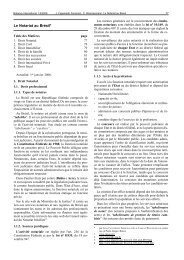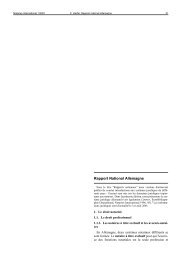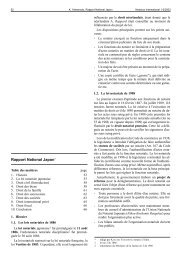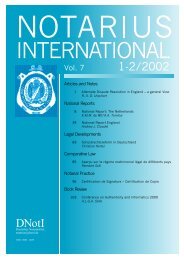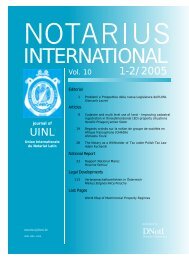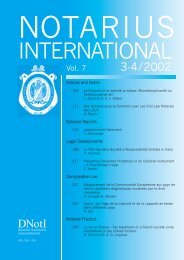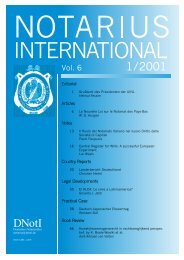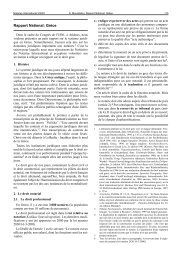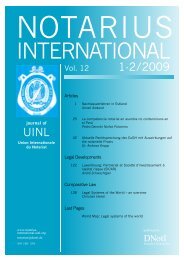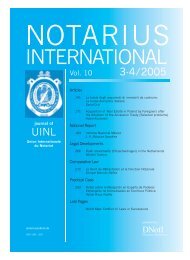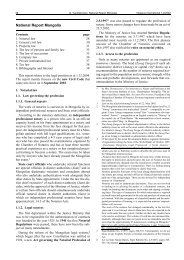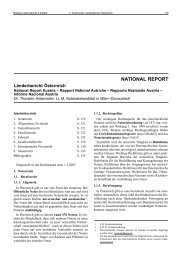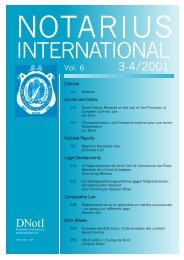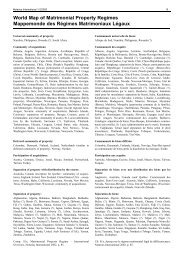National Report Mexico - Notarius International
National Report Mexico - Notarius International
National Report Mexico - Notarius International
Create successful ePaper yourself
Turn your PDF publications into a flip-book with our unique Google optimized e-Paper software.
<strong>Notarius</strong> <strong>International</strong> 3-4/2005 J. A. Márquez González, <strong>National</strong> <strong>Report</strong> <strong>Mexico</strong> 209<br />
The capacity to make a will is presumed. That, in effect,<br />
is the formulation contained in article 1305, although<br />
in a negative sense. Article 1306 provides as follows:<br />
“The following persons do not have the capacity to<br />
make a will: “I. Minors, either male or female, under the<br />
age of sixteen; and II. Persons who are habitually or temporarily<br />
not of sound mind”. This provision therefore repeals<br />
the general rule contained in article 646, that establishes<br />
a legal age of 18 or over.<br />
We should state that only the civil codes of the states of<br />
Michoacán (article 1171), Puebla (article 3065), Quintana<br />
Roo (article 1252), Tabasco (article 1386) and Tlaxcala<br />
(article 2641) state that the legal age to make a will is 14,<br />
since the rest of the country's civil legislation (for example,<br />
article 1306 of the CCFD and article 1239 of the Civil<br />
Code of Veracruz) require the testator to be 16 or over.<br />
4.5. Types of will<br />
Our Civil Code contemplates a great many types of<br />
will. In principle however, wills can be classified under<br />
just two overall headings, i.e.: ordinary and special. Ordinary<br />
wills under our law include open public wills,<br />
closed wills, simplified wills and holograph wills (article<br />
1500). Special wills include private wills, military wills,<br />
maritime wills and wills made overseas (article 1501).<br />
We should also note that the codes of Aguascalientes<br />
(articles 1411-1 413), Coahuila (articles 972-974), Chihuahua<br />
(article 1406), Oaxaca (articles 1403-1405),<br />
Puebla (articles 3259-3261) and Tlaxcala (articles 2803-<br />
2807) do not list holograph wills and that, incidentally,<br />
the code of Nayarit does not contemplate wills made<br />
overseas or military wills or maritime wills. The new<br />
Civil Code of the State of <strong>Mexico</strong> now only contemplates<br />
open public wills, simplified public wills, military wills,<br />
maritime wills and wills made overseas (articles 6,120-<br />
6,121). The Civil Code of Veracruz (article 1454) refers<br />
to what are known in other legal systems as “closed public<br />
wills” as “closed notarial wills” and also calls holographs<br />
“autographs” (article 1483). However, both changes<br />
are solely of form. The Civil Code of Jalisco already<br />
contemplates electronic wills (article 2848) and the civil<br />
codes of Guerrero and Querétaro allow wills made in the<br />
air (articles 1459 and 1381, respectively). The Civil Code<br />
of Guerrero even authorises wills made in spacecraft<br />
“from lift-off onwards” (ditto, 1381).<br />
4.5.1. Open public wills<br />
These wills are classified as “public” and “open” due to<br />
the fact that they are made before an attester, in other<br />
words, a notary public, and are therefore necessarily entered<br />
in the notarial records. Until recently, they were<br />
drafted, signed and attested in the presence of three attesting<br />
witnesses.<br />
Most of the codes in the Republic continue to require<br />
the formality of three attesting witnesses when executing<br />
an open public will. Exceptions to this are the civil<br />
codes of the states of Nayarit (article 2647), the Federal<br />
District (article 1513), Jalisco (article 2842), Baja California<br />
Sur (article 1418), Veracruz (article 1444), Querétaro<br />
(article 1388), Colima (article 1407) and Sonora (article<br />
1589), which establish that two witnesses may attend<br />
at the request of the testator or the notary. The requirement<br />
is merely optional. In practice the act takes place<br />
without witnesses and, in fact, the definition of a will in<br />
the dogma has been reduced to the following: “An open<br />
public will is a will that is made before a notary”, thus superseding<br />
the previous formula which stated: “... before a<br />
notary and three witnesses” (article 1511 of the CCFD<br />
and article 1444 of the Civil Code of Veracruz). The Civil<br />
Code of Chihuahua, with amendments from December<br />
2002, still retains the three witnesses (article 1415).<br />
This type of will requires close involvement and supervision<br />
by the notary, making him responsible at all times<br />
for drafting the clauses, ensuring that it conforms strictly<br />
to its author's wishes, reading out the will immediately<br />
after it has been made, the setting the respective signatures<br />
and the final witnessing of the act.<br />
Concrete provisions applying very specifically then<br />
govern the conduct of the notary responsible: articles<br />
1514 and 1516-1518 govern exceptional circumstances<br />
such as when the testator cannot or does not know how to<br />
sign, when he or she is completely deaf or blind or does<br />
not know the local language. Article 1519 contemplates<br />
the principles of concentrated single act and attesting to<br />
full compliance with the formalities, subject to the penalties<br />
(article 1520) of invalidity of the will and liability for<br />
the notary.<br />
4.5.2. Closed public wills<br />
Unlike open public wills, this type of will is not entered<br />
in any official record and for that reason is considered as<br />
“closed”. Nevertheless, it is still public because it involves<br />
the notary and witnesses.<br />
Wills of this type can be written by the testator, but also<br />
by another person, and can even be written on ordinary<br />
paper. These documents are characterised by the fact that,<br />
immediately after they have been drafted, paraphed and<br />
signed, they must be wrapped in a sealed paper. It must<br />
then be exhibited to the notary in the presence of three<br />
witnesses, declaring that the paper contains his or her last<br />
will and testament. This means that not even the attester<br />
can know the terms of the will. The witnesses are also unable<br />
to discover the terms of the will and the only way<br />
that an outside party can possibly discover them is if another<br />
person must sign at the request of the author if the<br />
author cannot or does not know how to sign and it is clear<br />
that this person must enjoy the author's full confidence.<br />
This type of will therefore completely fulfils the requirement<br />
for confidentiality while still being formally submitted<br />
to a notary.<br />
The notary, in fact, attests to the execution of the will<br />
and must also ensure that all the formalities inherent in<br />
acts of this type are fulfilled. In accordance with the provisions<br />
contained in article 1526, the notary must also attest<br />
to the cover itself of the document and it must then<br />
be signed by the testator, witnesses and the notary.<br />
The next step consists of the physical delivery of the respective<br />
document by the testator to the notary and the notary<br />
must then enter in his records the date on which the<br />
will was witnessed by him and returned to its author. This



